中考英语复习之被动语态 课件(66张PPT,含音视频控件)
文档属性
| 名称 | 中考英语复习之被动语态 课件(66张PPT,含音视频控件) |  | |
| 格式 | zip | ||
| 文件大小 | 27.1MB | ||
| 资源类型 | 教案 | ||
| 版本资源 | 人教新目标(Go for it)版 | ||
| 科目 | 英语 | ||
| 更新时间 | 2020-03-13 20:28:22 | ||
图片预览

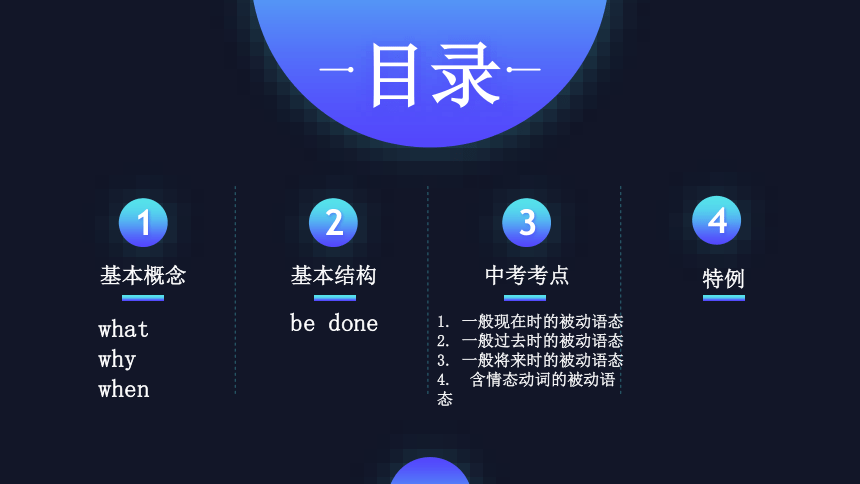

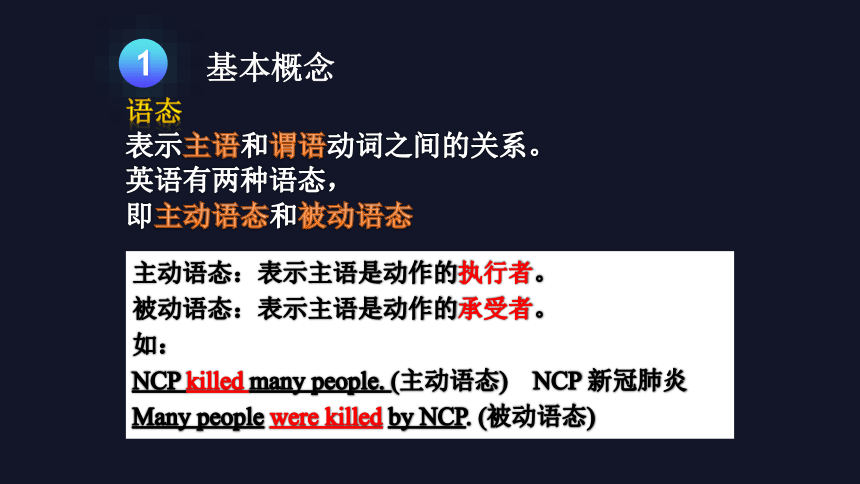
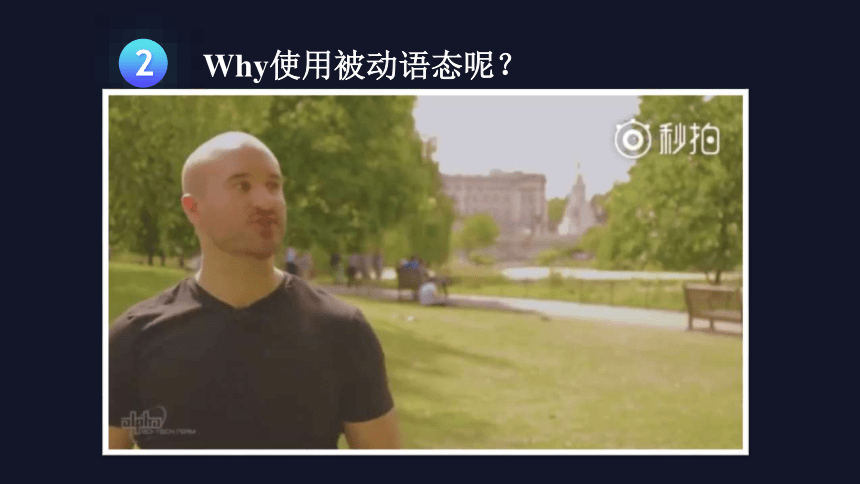
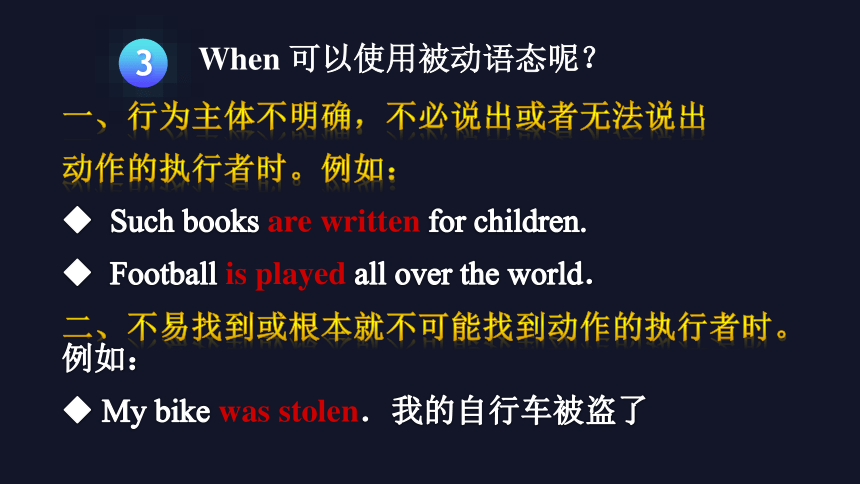
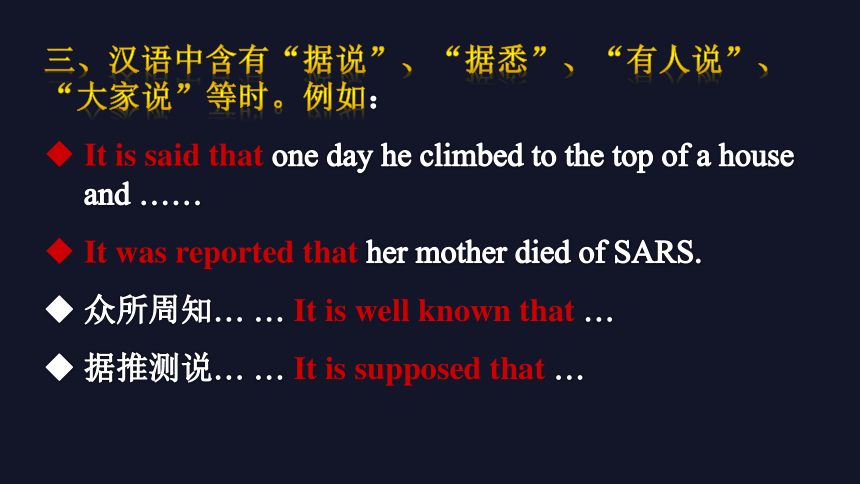
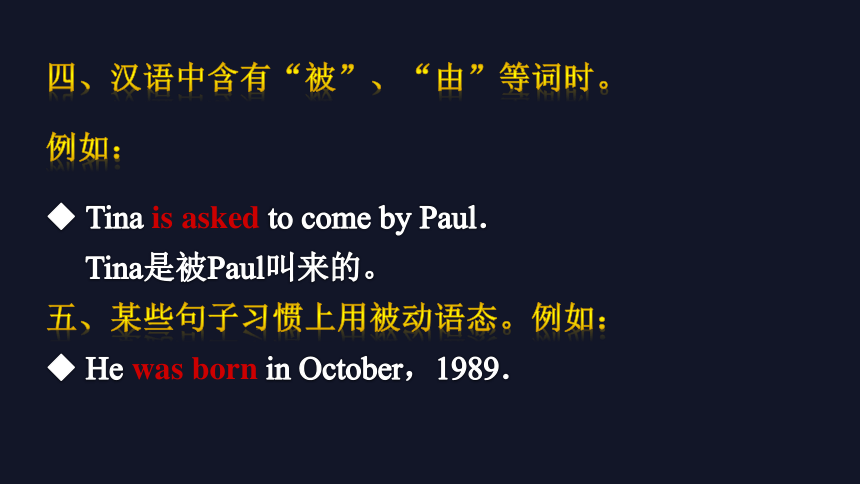

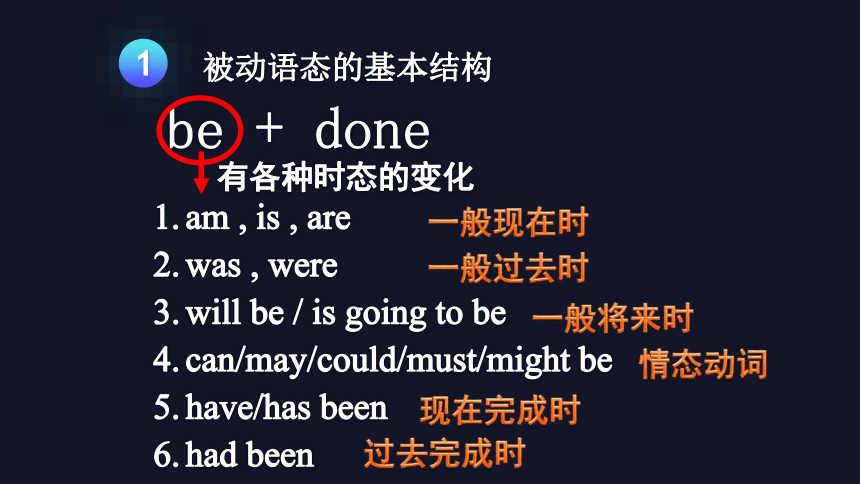
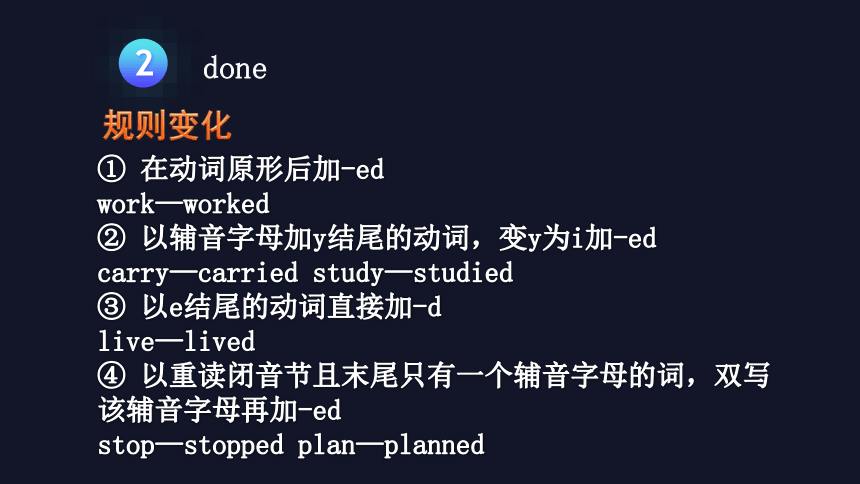
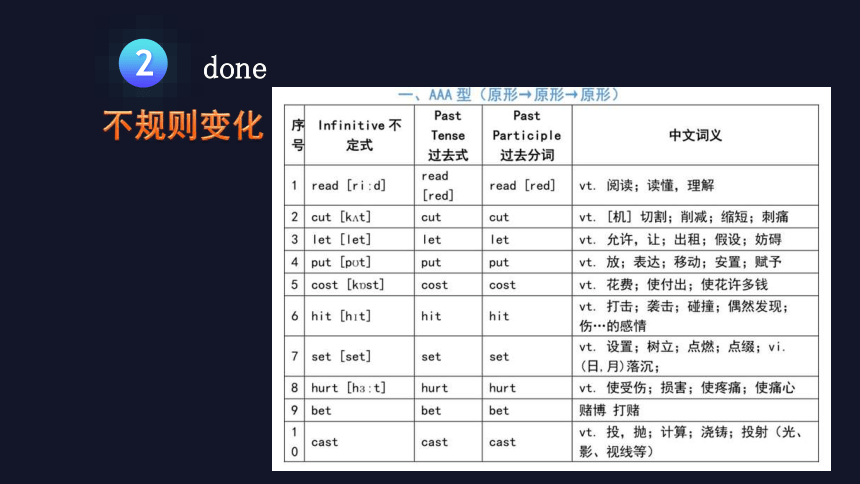
文档简介
(共66张PPT)
2020
被动语态
陈贞贞
Passive Voice
目录
1
基本概念
2
3
4
基本结构
中考考点
1. 一般现在时的被动语态
2. 一般过去时的被动语态
3. 一般将来时的被动语态
4. 含情态动词的被动语态
特例
what
why
when
be done
1
1
1
1
基本概念
What Why When
1
语态
表示主语和谓语动词之间的关系。
英语有两种语态,
即主动语态和被动语态
主动语态:表示主语是动作的执行者。
被动语态:表示主语是动作的承受者。
如:
NCP killed many people. (主动语态) NCP 新冠肺炎
Many people were killed by NCP. (被动语态)
基本概念
2
Why使用被动语态呢?
3
When 可以使用被动语态呢?
一、行为主体不明确,不必说出或者无法说出
动作的执行者时。例如:
Such books are written for children.
Football is played all over the world.
二、不易找到或根本就不可能找到动作的执行者时。例如:
My bike was stolen.我的自行车被盗了
三、汉语中含有“据说”、“据悉”、“有人说”、“大家说”等时。例如:
It is said that one day he climbed to the top of a house and ……
It was reported that her mother died of SARS.
众所周知… … It is well known that …
据推测说… … It is supposed that …
四、汉语中含有“被”、“由”等词时。
例如:
Tina is asked to come by Paul.
Tina是被Paul叫来的。
五、某些句子习惯上用被动语态。例如:
He was born in October,1989.
2
2
2
2
基本结构
be done
1
被动语态的基本结构
有各种时态的变化
am , is , are
was , were
will be / is going to be
can/may/could/must/might be
have/has been
had been
be + done
一般现在时
一般过去时
一般将来时
情态动词
现在完成时
过去完成时
2
done
① 在动词原形后加-ed
work—worked
② 以辅音字母加y结尾的动词,变y为i加-ed
carry—carried study—studied
③ 以e结尾的动词直接加-d
live—lived
④ 以重读闭音节且末尾只有一个辅音字母的词,双写该辅音字母再加-ed
stop—stopped plan—planned
规则变化
2
done
不规则变化
sold
sold
1
https://ks.wjx.top/jq/59714800.aspx
恭喜过关
Congratulations!
3
3
3
3
中考考点
1. 一般现在时的被动语态
2. 一般过去时的被动语态
3. 一般将来时的被动语态
4. 含情态动词的被动语态
The flowers
every day.
are watered
by her
She waters the flowers every day.
主 谓 宾
后面能接宾语的动词才有被动语态
主动变被动的方法:
She waters the flowers every day.
主 谓 宾
The flowers are watered by her every day.
① ② ③ ④
总结:
主动语态 被动语态
宾语 →
谓语 →
主语 →
其他 →
主语
be+ P.P
by +宾语
1. 将主动语态的宾语变为被动语态的主语。
2. 将主动语态的谓语动词由主动变为被动。
3. 将主动语态的主语变为被动语态中介词 by 的宾语
放在谓动词之后。
抄下来
1
2
https://ks.wjx.top/jq/59714780.aspx
恭喜过关
Congratulations!
by many students.
1.Many students study English.
English
is studied
2.They make shoes in that factory.
Shoes
are made
by them
in that factory.
一般现在时的被动语态结构:
is/are+过去分词
1
They play football on Sunday.
Lucy does the homework in the evening.
They often use computers in class.
We make these machines in Beijing.
Football is played by them on Sunday.
The homework is done by Lucy in the evening.
Computers are often used by them in class.
These machines are made by us in Beijing.
1. They bought a computer last term.
by them last term.
一般过去时的被动语态结构:
was/were +过去分词
by us last year.
2.We planted many trees last year.
Many trees
were planted
A computer
was bought
2
They built the tall building last year.
He took good care of his little brother yesterday.
We cleaned our classroom just now.
They used the rooms for resting.
The tall building was built by them last year.
His little brother was taken good care of by him yesterday.
Our classroom was cleaned by us just now.
The rooms were used for resting by them.
1. She is going to plant some flowers tomorrow.
(by her) tomorrow.
一般将来时的被动语态结构:
is/are going to/ will +be +过去分词
(by them )for the poor kids.
2. They will set up a school for the poor kids.
A school
will be set up
Some flowers
are going to be planted
3
含有情态动词的被动语态结构:
can/may/must/should + be+过去分词
1.Amy can take good care of Gina .
by Amy.
Gina
can be taken good care of
2.You should drink more water.
More water
should be drunk
by you.
4
1.He can take care of the baby.
2.Lucy may draw the pictures.
3.You must turn off the lights.
4.They should learn English well.
The baby can be taken care of by him.
The picture may be drawn by Lucy.
The lights must be turned off by you.
English should be learned well by them.
一般现在时:
一般过去时:
一般将来时:
情态动词:
am/is /are + done
情态动词+be+done
was/were + done
以下时态的被动语态构成
Summary
Task 4
is/are going to/ will +be+done
一般现在时和一般过去时的被动语态:将be动词移位、变否定。
例如:
Is tea produced in your country?
I’m not asked to get up early on weekends.
Was the watch made in Switzerland?
The products weren’t sent by ship.
一般将来时和含情态动词的被动语态:将第一个动词移位、变否定。
例如:
Will it be finished soon?
Students shouldn’t be allowed to bring mobile phones to school.
5
被动语态的疑问式和否定式变化如下:
4
4
4
4
特例
带双宾语句子的被动语态.一般把间接宾语变为被动语态的主语,则另一个不动。如把直接宾语变为被动语态的主语则需在间宾前加 for 或 to
如:
1.He gave me a book.
-I was given a book by him.
-A book was given to me by Tom.
2. I bought him a book.
-He was bought a book by me.
-A book was buoght for him by me.
give sb. sth— buy sb sth—
sb be given sth sb be bought sth-
sth be given to sb. sth be bought for sb.
1
【考点】
sb be asked to do
sb be told to do
sb be invited to do
sb be chosen to do
sb be encouraged to do
sb be allowed to do
ask sb. to do
tell sb. to do
invite sb. to do
choose sb. to do
encourage sb. to do
allow sb. to do
主动
被动
主动语态为带to的动词不定式
Mum told me to stay at home.
I was told to stay at home.
2
1.I saw him play basketball last Sunday.
He
was seen
to play basketball last Sunday.
2.The boss makes him work for 10 hours.
He
is made
to work for 10 hours.
即hear , watch , see , make , let ,这些词在变被动句时必须加to.
make sb do sth--sb be made to do sth.
see sb do sth—sb be seen to do sth.
3
在主动语态中省去to,在变为被动语态时应加上to.
【考点】
make sb. do
let sb. do
see sb. do
hear sb. do
watch sb. do
sb be made to do sb
sb be let to do
sb be seen to do
sb be heard to do
sb be watched to do
主动
被动
They take good care of my child.
I turned off the radio.
含有短语的主动语态变被动语态, 注意短语要完整,不能掉了介词
-----My child is taken good care of .
---The radio was turned off (by me).
4
【考点】
look for
look after
take care of
hand in
laugh at
speak to
be looked for
be looked after
be taken care of
be handed in
be laughed at
be spoken to
不要漏掉介词.
主动
被动
没有被动语态的词或短语
cost, happen, take place, close down ,
feel, sound, taste, smell, look, come out, come up, break down, stand for,
这些词主要分为一下几类:
5
1) look . smell . sound . feel . taste 等作连系动词用时 ,主动形式表被动意义。
Eg. 棉花摸起来很柔软。
Cotton feels soft.
这老妇人看起来焦急The old woman looks worried .
2) write(很好写) read(很好看)sell(卖得好)wash(很好洗)open(商店开门)last(持续很久)等常用主动表被动。
Eg 这笔很好用。 This pen writes well.
这书很畅销 This book sells well.
The shop will open at eight o’clock.
3) 动词 need , require ,allow等接动名词doing作宾语构成主动结构表被动含义
他 的鞋需要修理。
He needed to mend his shoes.
His shoes needed to be mended.
His shoes needed mending .
need, allow 可以用-ing形式表示被动
need to be done = need doing
be allowed to do = allow doing
4)不及物动词没有被动语态
如:
happen(发生), take place(发生) , begin(开始),
become(成为,变得)disappear(消失), come out(出版)
An car accident happened in front of a school this morning.
What is happening there?
His book came out last year.
The movie will last for two hours.
The book cost 100 yuan.
1
2
3
https://ks.wjx.top/jq/59778018.aspx
2015—2019年中考题组
1.(2019宁波,45)In Ningbo, everyone knows that things in blue rubbish bins
can be ????(回收利用).
2.(2019衢州,64)He ????(invite) to have a business meeting. I knew that my father would surely come to my show if he could.
3.(2019湖州,70)I've found a friendly guide here and yesterday I ????(show)
around the city.
4.(2018宁波,50)For example, it mentioned that the zipper was ????(invent)by Whitcomb Judson in 1893.
5.(2018绍兴,49)Tea is ????(produce)in many different areas in China.
6.(2018湖州,66)First of all, I think more bike lanes should ????(build).
7.(2017嘉兴,59)The read-a-thons are ????(举行)not only to raise money, but also to encourage teenagers to read.
8.(2017台州,63)After hearing about sacrifices(牺牲)made by firemen, she
????(move)by the risks they face, so Savannah made 200 thank-you cards for them.
9.(2016嘉兴,62)She said the program ????(design)for some of the brighter
teenagers to experience a different culture.
10. (2017江苏南京,49)Libraries or reading corners ????(build) in hope
primary schools along the way of Long March in a few years.
2020
Thanks For Listening
陈贞贞
2
2
2
2
3
3
3
3
4
4
4
4
1
1
1
1
0
0
0
0
7
7
7
7
8
8
8
8
9
9
9
9
6
6
6
6
5
5
5
5
1
2
3
4
1
2
3
4
5
2020
被动语态
陈贞贞
Passive Voice
目录
1
基本概念
2
3
4
基本结构
中考考点
1. 一般现在时的被动语态
2. 一般过去时的被动语态
3. 一般将来时的被动语态
4. 含情态动词的被动语态
特例
what
why
when
be done
1
1
1
1
基本概念
What Why When
1
语态
表示主语和谓语动词之间的关系。
英语有两种语态,
即主动语态和被动语态
主动语态:表示主语是动作的执行者。
被动语态:表示主语是动作的承受者。
如:
NCP killed many people. (主动语态) NCP 新冠肺炎
Many people were killed by NCP. (被动语态)
基本概念
2
Why使用被动语态呢?
3
When 可以使用被动语态呢?
一、行为主体不明确,不必说出或者无法说出
动作的执行者时。例如:
Such books are written for children.
Football is played all over the world.
二、不易找到或根本就不可能找到动作的执行者时。例如:
My bike was stolen.我的自行车被盗了
三、汉语中含有“据说”、“据悉”、“有人说”、“大家说”等时。例如:
It is said that one day he climbed to the top of a house and ……
It was reported that her mother died of SARS.
众所周知… … It is well known that …
据推测说… … It is supposed that …
四、汉语中含有“被”、“由”等词时。
例如:
Tina is asked to come by Paul.
Tina是被Paul叫来的。
五、某些句子习惯上用被动语态。例如:
He was born in October,1989.
2
2
2
2
基本结构
be done
1
被动语态的基本结构
有各种时态的变化
am , is , are
was , were
will be / is going to be
can/may/could/must/might be
have/has been
had been
be + done
一般现在时
一般过去时
一般将来时
情态动词
现在完成时
过去完成时
2
done
① 在动词原形后加-ed
work—worked
② 以辅音字母加y结尾的动词,变y为i加-ed
carry—carried study—studied
③ 以e结尾的动词直接加-d
live—lived
④ 以重读闭音节且末尾只有一个辅音字母的词,双写该辅音字母再加-ed
stop—stopped plan—planned
规则变化
2
done
不规则变化
sold
sold
1
https://ks.wjx.top/jq/59714800.aspx
恭喜过关
Congratulations!
3
3
3
3
中考考点
1. 一般现在时的被动语态
2. 一般过去时的被动语态
3. 一般将来时的被动语态
4. 含情态动词的被动语态
The flowers
every day.
are watered
by her
She waters the flowers every day.
主 谓 宾
后面能接宾语的动词才有被动语态
主动变被动的方法:
She waters the flowers every day.
主 谓 宾
The flowers are watered by her every day.
① ② ③ ④
总结:
主动语态 被动语态
宾语 →
谓语 →
主语 →
其他 →
主语
be+ P.P
by +宾语
1. 将主动语态的宾语变为被动语态的主语。
2. 将主动语态的谓语动词由主动变为被动。
3. 将主动语态的主语变为被动语态中介词 by 的宾语
放在谓动词之后。
抄下来
1
2
https://ks.wjx.top/jq/59714780.aspx
恭喜过关
Congratulations!
by many students.
1.Many students study English.
English
is studied
2.They make shoes in that factory.
Shoes
are made
by them
in that factory.
一般现在时的被动语态结构:
is/are+过去分词
1
They play football on Sunday.
Lucy does the homework in the evening.
They often use computers in class.
We make these machines in Beijing.
Football is played by them on Sunday.
The homework is done by Lucy in the evening.
Computers are often used by them in class.
These machines are made by us in Beijing.
1. They bought a computer last term.
by them last term.
一般过去时的被动语态结构:
was/were +过去分词
by us last year.
2.We planted many trees last year.
Many trees
were planted
A computer
was bought
2
They built the tall building last year.
He took good care of his little brother yesterday.
We cleaned our classroom just now.
They used the rooms for resting.
The tall building was built by them last year.
His little brother was taken good care of by him yesterday.
Our classroom was cleaned by us just now.
The rooms were used for resting by them.
1. She is going to plant some flowers tomorrow.
(by her) tomorrow.
一般将来时的被动语态结构:
is/are going to/ will +be +过去分词
(by them )for the poor kids.
2. They will set up a school for the poor kids.
A school
will be set up
Some flowers
are going to be planted
3
含有情态动词的被动语态结构:
can/may/must/should + be+过去分词
1.Amy can take good care of Gina .
by Amy.
Gina
can be taken good care of
2.You should drink more water.
More water
should be drunk
by you.
4
1.He can take care of the baby.
2.Lucy may draw the pictures.
3.You must turn off the lights.
4.They should learn English well.
The baby can be taken care of by him.
The picture may be drawn by Lucy.
The lights must be turned off by you.
English should be learned well by them.
一般现在时:
一般过去时:
一般将来时:
情态动词:
am/is /are + done
情态动词+be+done
was/were + done
以下时态的被动语态构成
Summary
Task 4
is/are going to/ will +be+done
一般现在时和一般过去时的被动语态:将be动词移位、变否定。
例如:
Is tea produced in your country?
I’m not asked to get up early on weekends.
Was the watch made in Switzerland?
The products weren’t sent by ship.
一般将来时和含情态动词的被动语态:将第一个动词移位、变否定。
例如:
Will it be finished soon?
Students shouldn’t be allowed to bring mobile phones to school.
5
被动语态的疑问式和否定式变化如下:
4
4
4
4
特例
带双宾语句子的被动语态.一般把间接宾语变为被动语态的主语,则另一个不动。如把直接宾语变为被动语态的主语则需在间宾前加 for 或 to
如:
1.He gave me a book.
-I was given a book by him.
-A book was given to me by Tom.
2. I bought him a book.
-He was bought a book by me.
-A book was buoght for him by me.
give sb. sth— buy sb sth—
sb be given sth sb be bought sth-
sth be given to sb. sth be bought for sb.
1
【考点】
sb be asked to do
sb be told to do
sb be invited to do
sb be chosen to do
sb be encouraged to do
sb be allowed to do
ask sb. to do
tell sb. to do
invite sb. to do
choose sb. to do
encourage sb. to do
allow sb. to do
主动
被动
主动语态为带to的动词不定式
Mum told me to stay at home.
I was told to stay at home.
2
1.I saw him play basketball last Sunday.
He
was seen
to play basketball last Sunday.
2.The boss makes him work for 10 hours.
He
is made
to work for 10 hours.
即hear , watch , see , make , let ,这些词在变被动句时必须加to.
make sb do sth--sb be made to do sth.
see sb do sth—sb be seen to do sth.
3
在主动语态中省去to,在变为被动语态时应加上to.
【考点】
make sb. do
let sb. do
see sb. do
hear sb. do
watch sb. do
sb be made to do sb
sb be let to do
sb be seen to do
sb be heard to do
sb be watched to do
主动
被动
They take good care of my child.
I turned off the radio.
含有短语的主动语态变被动语态, 注意短语要完整,不能掉了介词
-----My child is taken good care of .
---The radio was turned off (by me).
4
【考点】
look for
look after
take care of
hand in
laugh at
speak to
be looked for
be looked after
be taken care of
be handed in
be laughed at
be spoken to
不要漏掉介词.
主动
被动
没有被动语态的词或短语
cost, happen, take place, close down ,
feel, sound, taste, smell, look, come out, come up, break down, stand for,
这些词主要分为一下几类:
5
1) look . smell . sound . feel . taste 等作连系动词用时 ,主动形式表被动意义。
Eg. 棉花摸起来很柔软。
Cotton feels soft.
这老妇人看起来焦急The old woman looks worried .
2) write(很好写) read(很好看)sell(卖得好)wash(很好洗)open(商店开门)last(持续很久)等常用主动表被动。
Eg 这笔很好用。 This pen writes well.
这书很畅销 This book sells well.
The shop will open at eight o’clock.
3) 动词 need , require ,allow等接动名词doing作宾语构成主动结构表被动含义
他 的鞋需要修理。
He needed to mend his shoes.
His shoes needed to be mended.
His shoes needed mending .
need, allow 可以用-ing形式表示被动
need to be done = need doing
be allowed to do = allow doing
4)不及物动词没有被动语态
如:
happen(发生), take place(发生) , begin(开始),
become(成为,变得)disappear(消失), come out(出版)
An car accident happened in front of a school this morning.
What is happening there?
His book came out last year.
The movie will last for two hours.
The book cost 100 yuan.
1
2
3
https://ks.wjx.top/jq/59778018.aspx
2015—2019年中考题组
1.(2019宁波,45)In Ningbo, everyone knows that things in blue rubbish bins
can be ????(回收利用).
2.(2019衢州,64)He ????(invite) to have a business meeting. I knew that my father would surely come to my show if he could.
3.(2019湖州,70)I've found a friendly guide here and yesterday I ????(show)
around the city.
4.(2018宁波,50)For example, it mentioned that the zipper was ????(invent)by Whitcomb Judson in 1893.
5.(2018绍兴,49)Tea is ????(produce)in many different areas in China.
6.(2018湖州,66)First of all, I think more bike lanes should ????(build).
7.(2017嘉兴,59)The read-a-thons are ????(举行)not only to raise money, but also to encourage teenagers to read.
8.(2017台州,63)After hearing about sacrifices(牺牲)made by firemen, she
????(move)by the risks they face, so Savannah made 200 thank-you cards for them.
9.(2016嘉兴,62)She said the program ????(design)for some of the brighter
teenagers to experience a different culture.
10. (2017江苏南京,49)Libraries or reading corners ????(build) in hope
primary schools along the way of Long March in a few years.
2020
Thanks For Listening
陈贞贞
2
2
2
2
3
3
3
3
4
4
4
4
1
1
1
1
0
0
0
0
7
7
7
7
8
8
8
8
9
9
9
9
6
6
6
6
5
5
5
5
1
2
3
4
1
2
3
4
5
同课章节目录
- 词法
- 名词
- 动词和动词短语
- 动词语态
- 动词时态
- 助动词和情态动词
- 非谓语动词
- 冠词
- 代词
- 数词和量词
- 形容词副词及其比较等级
- 介词和介词短语
- 连词和感叹词
- 构词法
- 相似、相近词比较
- 句法
- 陈述句
- 一般疑问句和否定疑问句
- 特殊疑问句及选择疑问句
- 反意疑问句
- 存在句(There be句型)
- 宾语从句
- 定语从句
- 状语从句
- 主谓一致问题
- 简单句
- 并列句
- 复合句
- 主谓一致
- 主、表语从句
- 名词性从句
- 直接引语和间接引语
- 虚拟语气
- 感叹句
- 强调句
- 倒装句
- 祈使句
- 句子的成分
- 句子的分类
- 题型专区
- 单项选择部分
- 易错题
- 完形填空
- 阅读理解
- 词汇练习
- 听说训练
- 句型转换
- 补全对话
- 短文改错
- 翻译
- 书面表达
- 任务型阅读
- 语法填空
- 其他资料
